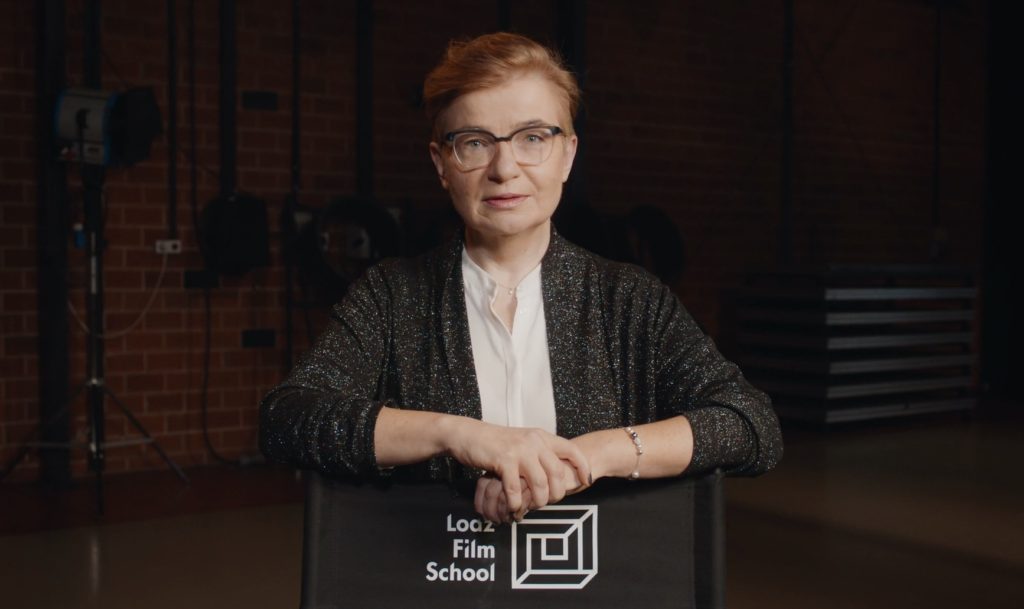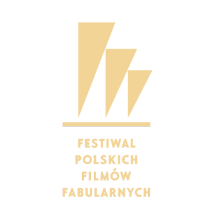I believe in art, as an act of communication

The Film School in Lodz has the 75th anniversary of its foundation. We talk about this anniversary and more with Milenia Fiedler, film editor, lecturer of the Lodz Film School and the school’s president in the years 2020–2024.
Mateusz Demski: What does the Film School in Lodz mean for you?
Milenia Fiedler: For me and everyone else interested in cinema in Poland, the Film School has been an important benchmark. We all remember the School’s tradition and the important names that helped create it. The School is all the generations of great filmmakers, who could discover and develop their talent, sensitivity and worldview there. 75 years of the School – it’s 75 years of Polish cinematography.
The Film School in Lodz isn’t about its walls. It’s not an institution. It’s a community. It’s a place of free exchange of thought, inspiration, attitudes towards the world and the art of film. Education in the Lodz school isn’t about a one-sided flow of information from the lecturers to the students – they influence each other, always have. The people and their ideas, their dreams, their desire to create – all of this combined – that’s what the Film School in Lodz is.
With this anniversary you discover the transgenerational relations between creators of different eras. During the New Horizons Festival in Wroclaw, I’ve seen the screenings of études dating back to the 60s and the beginnings of Grzegorz Królikiewicz’s work, and ending with films by Jagoda Szelc and Alicja Błaszczyńska. I believe only one thing hasn’t changed: the need to search, to look beyond the classic notion of cinema.
We’re trying to use the anniversary to present the School to the public at different festivals. We’d like to remind what the School was, but also show what it is now. The experimentation with the boundaries of film is a strong tradition there, in the School. It’s the current created by people like Rybczyński or Robakowski. Today the students follow the same trail but they’re hardly imitating. The need for experimentation with the very essence of the medium, reaching for new forms of expression, it’s ingrained into the tradition and reality of the School. It is connected to the fundamental idea of the School, the notion that it’s supposed to be the space for discovering one’s creative identity, one’s own style. Discovering the thing that makes us artists.
However, it’s undeniable that the world has changed throughout the years, the focus of discussion on social topics has changed. The abuse of students in the School has been discussed in detail recently.
The School obviously has to respond to the reality and how it changes constantly. It’s a wide area of change in film and theatre – technological changes, production models changes, but also the need for change in relations within the creative teams. We’re at the point where the long-accepted norms are questioned and we need to review our thinking, to include the qualities of a human being – dignity, equality, trust. It’s a big shift in communication, in the rules of cooperation and an attempt to find the right balance in hierarchy present at the film set or in the theatre. A creative process isn’t just an ordinary job. Films and plays we create, for us, are a piece of ourselves, and that’s why the emotional strain and interpersonal ties are so intense. We’re looking for a new arrangement between the participants of this creative process.
The discussion in school is about all that but also about the relationship between the teachers and students. The process of change is ongoing and parallel to whatever’s happening in the film and theatre industry. We all participate in the change. It’s not like we have a solution ready. But we do have expectations and we’re not going to accept certain past norms anymore. We demand from each other that the communication is based on respect and doesn’t allow for violence or objectification of anyone. No creator – their talent, their sensitivity – can be treated like nothing more than a material for somebody’s art.
But the changes are also about what we talked about before. I mean the way streaming services and artificial intelligence will influence the industry.
That’s right. Another important matter of change is, of course, the audio-visual art. These new fields of distribution are an example, and they force a change in the language of expression – just like the emergence of television did before. The School has to constantly address the changing paradigms and mentally prepare for tackling the issue that will undoubtedly impact art as we know it. What I mean is the possibility to generate creative content with artificial intelligence – we have to tackle it on the philosophical and legal level but also ask the simplest question: can we take this new tool and use it? School is a great place for such discussions. It’s already a forum for discussing what’s happening to film. As lecturers, our experience always has to clash with what the students and the youth in general feel. Experience doesn’t close off your horizons.
Do you have your own forecast for the future?
I can see, and I know I’m not the only one, many things that make me concerned. Cinema, as a community experience, especially for my generation, when it was a big part of the art’s impact, is undoubtedly changing. The death of cinema was prophesied several times but it always managed to find a path for itself and is still there. But you asked about my forecast. I’m certain that the future can’t be glimpsed into in a crystal ball or guessed through intellectual effort. The future will be whatever we make it. And it’s made through actions, decisions, choices we make, while never fully aware of their consequences. The future will be whatever we create. I think that when it comes to the future of the cinema, the most important thing is loyalty to the idea of cinema as art. As creators, we need to know what we create for, who we create for, what do we want to achieve and how do we want to influence the viewers. Let’s be honest when turning our attention towards the audience and wondering who they are, what do they expect, and what are they willing to receive. I believe in art, as an act of communication.
And the future is always for the young. That’s why the Film School is such a fantastic place!
Milenia Fiedler – film editor. Her portfolio includes over thirty feature films, dozens of teleplays, documentaries and TV series. She collaborated with e.g. Andrzej Wajda, Wojciech Marczewski, Krzysztof Zanussi, Urszula Antoniak. She worked on such films as The Gateway of Europe (1999), Weiser (2001), Katyn (2007), Lynch (2010), Walesa: Man of Hope (2013). Lecturer of the Lodz Film School and the school’s president in the years 2020–2024. Member of the European Film Academy.
Quote:
And the future is always for the young. That’s why the Film School is such a fantastic place!
Apla
For the 75th anniversary of the foundation of the Film School in Lodz, there’ll be screenings of études by graduates, whose films are nominated to this year’s Main Competition and Short Film Competition at the Polish Film Festival today at 10:00 a.m.
The following études will be shown:
Ravens and Crows Will Peck Us to Pieces, directed by: Jan Holoubek
Möbius Strip, directed by: Łukasz Karwowski
A Man Thing, directed by: Sławomir Fabicki
The Egg, directed by: Dorota Kędzierzawska
House for Julie, directed by: Sebastian Buttny
From the Life of Scarecrows, directed by: Grzegorz Dębowski
The End, directed by: Klaudiusz Chrostowski


